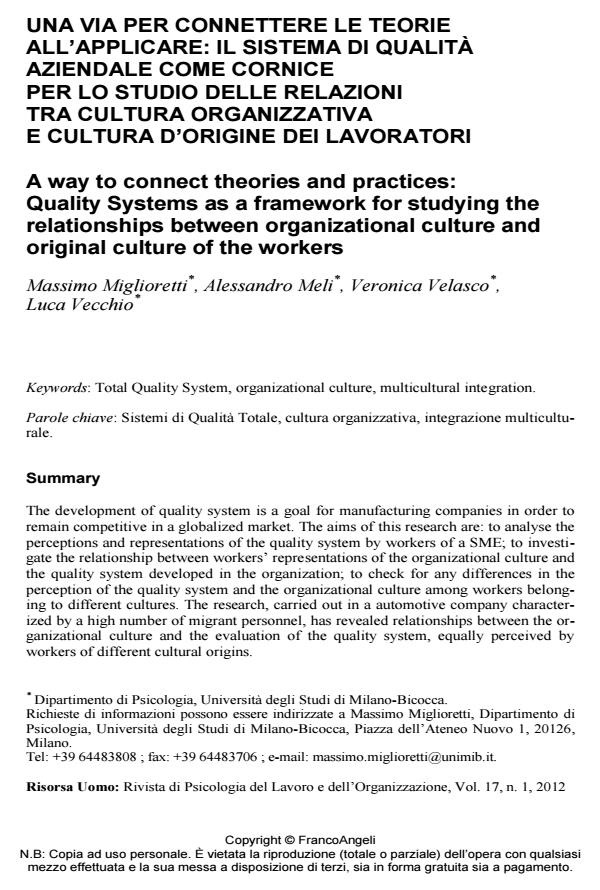Una via per connettere le teorie all’applicare: il sistema di qualità aziendale come cornice per lo studio delle relazioni tra cultura organizzativa e cultura d’origine dei lavoratori
Titolo Rivista RISORSA UOMO
Autori/Curatori Massimo Miglioretti, Alessandro Meli, Veronica Velasco, Luca Vecchio
Anno di pubblicazione 2014 Fascicolo 2012/1 Lingua Italiano
Numero pagine 17 P. 119-135 Dimensione file 911 KB
DOI 10.3280/RU2012-001011
Il DOI è il codice a barre della proprietà intellettuale: per saperne di più
clicca qui
Qui sotto puoi vedere in anteprima la prima pagina di questo articolo.
Se questo articolo ti interessa, lo puoi acquistare (e scaricare in formato pdf) seguendo le facili indicazioni per acquistare il download credit. Acquista Download Credits per scaricare questo Articolo in formato PDF

FrancoAngeli è membro della Publishers International Linking Association, Inc (PILA)associazione indipendente e non profit per facilitare (attraverso i servizi tecnologici implementati da CrossRef.org) l’accesso degli studiosi ai contenuti digitali nelle pubblicazioni professionali e scientifiche
The development of quality system is a goal for manufacturing companies in order to remain competitive in a globalized market. The aims of this research are: to analyse the perceptions and representations of the quality system by workers of a SME; to investigate the relationship between workers’ representations of the organizational culture and the quality system developed in the organization; to check for any differences in the perception of the quality system and the organizational culture among workers belonging to different cultures. The research, carried out in a automotive company characterized by a high number of migrant personnel, has revealed relationships between the organizational culture and the evaluation of the quality system, equally perceived by workers of different cultural origins;
Keywords:Sistemi di Qualità Totale, cultura organizzativa, integrazione multiculturale.
- American Quality Foundation, Ernst, & Young (1992). The international quality study best practices report: An analysis of management practices that impact perfor mance. Montvale, NJ: National Association of Accounting.
- Baird, K., Jia Hu, K., & Reeve, R. (2011). The relationships between organizational culture, total quality management practices and operational performance. Interna tional Journal of Operations & Production Management, 31(7), 789-814. DOI: 10.1108/0144357111114485
- Benson, P. G., Saraph, J. V., & Schroeder, R. G. (1991). The effects of organizational context on quality management: An empirical investigation. Management Sci ence, 37(9), 1107-1124. DOI: 10.1287/mnsc.37.9.110
- Biazzo, S., & Bernardi, G. (2003). Process management practices and quality systems standards. Risks and opportunities of the new ISO 9001 certification. Business Pro cess Management Journal, 9, 149-169. DOI: 10.1108/14637150310468371
- Boselie, P., & Van der Wiele, T. (2002). Employee perceptions of HRM and TQM, and the effects on satisfaction and intention to leave. Managing Service Quality, 12, 165-172. DOI: 10.1108/0960452021042923
- Cameron, K. S., & Quinn, R. E. (1999). Diagnosing and changing organizational cul ture. Reading, MA: Addison-Wesley.
- Cervai, S., & Gabassi, P. G. (2001). Uno strumento di rilevazione degli aspetti psicolo gici della qualità totale. Risorsa Uomo, 8(1-2), 15-17. DOI: 10.1400/7966
- Das, A., Pagell, M., Behm, M., & Veltri, A. (2007). Toward a theory of the linkages between safety and quality. Journal of Operations Management, 26, 521-535. DOI: 10.1016/2007.06.00
- Eisemberger, R., Armeli, S., Rexwinkel, B., Lynch, P. D., & Rhoades, L. (2001). Recip rocation of perceived organizational support. Journal of Applied Psychology, 86, 42-51. DOI: 10.1037/0021-9010.86.1.4
- Kreitner, R, & Kinicki, A. (2004). Organizational behavior. Burr Ridge, ILL: McGraw-Hill/Irvin.
- Powell, T.C. (1995). Total quality management as competitive advantage: A review and empirical study. Strategic Management Journal, 16, 15-37. DOI: 10.1002/smj.425016010
- Soltani, E., van der Meer, R., & Williams, T. (2005), A contrast of HRM and TQM ap proaches to performance management: Some evidence. British Journal of Manage ment, 16, 211-230. DOI: 10.1111/j.1467-8551.2005.00452.
- Taylor, W.A., & Wright, G.H. (2003). A longitudinal study of TQM implementation: Factors influencing success and failure. The international Journal of Management Science, 31, 97-111. DOI: 10.1016/S0305-048
- Yong, J., & Wilkinson, A. (1999). The state of Total Quality Management: A review. The International Journal of Human Resource Management, 10, 137-161. DOI: 10.1080/09585199934068
- Yusof, S. M., & Aspinwall, E. (2000). TQM implementations issues: Review and case study. International Journal of Operations & Production Management, 20(6), 634-655. DOI: 10.1108/0144357001032159
Massimo Miglioretti, Alessandro Meli, Veronica Velasco, Luca Vecchio, Una via per connettere le teorie all’applicare: il sistema di qualità aziendale come cornice per lo studio delle relazioni tra cultura organizzativa e cultura d’origine dei lavoratori in "RISORSA UOMO " 1/2012, pp 119-135, DOI: 10.3280/RU2012-001011